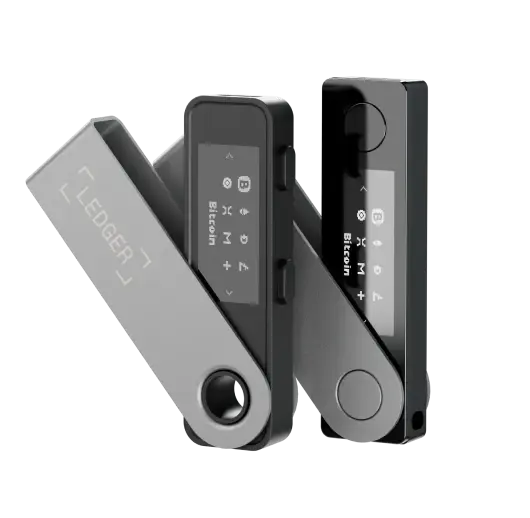Compare Ledger wallets
Get a Ledger Wallet
Select and purchase a Ledger hardware wallet of your choice.
- Beginner in the crypto world? Get started with Ledger Nano S Plus or Ledger Nano X.
- Prefer a touchscreen? Try with Ledger Flex or Ledger Stax.
Looking for a Bitcoin Wallet to buy and store your BTC? Join 7+ million customers who trust Ledger hardware wallets to securely store their crypto such as Bitcoin and use them on the day-to-day basis.
Trusted by over 7 million customers

Whether you’re looking to keep your crypto safe for long-term or manage them on a daily basis, Ledger has the right product for you.
A hardware wallet
Ledger hardware wallet stores your private keys and signs transactions offline, making them resistant to malicious attacks and threats. Pair the Ledger crypto wallet with the Ledger Live App to manage your Bitcoin (BTC) on the go.
A Bitcoin Wallet App
Ledger Live App is a gateway to manage your assets, checking your real-time balance, tracking transaction histories, and more.

Select and purchase a Ledger hardware wallet of your choice.

Download and install the Ledger Live app in a couple of clicks on desktop and mobile.
Coupled with a Ledger, it makes the most secured wallet for your Bitcoin.

Add a Bitcoin (BTC) account with a couple of clicks. Choose among different providers and easily manage your BTC.
And not only Bitcoin. With Ledger Live, you can manage thousands of crypto and a large variety of NFTs.

The most premium secure touchscreen hardware wallet to protect and manage your Bitcoin.

Designed with accessible sizing, enjoy the all new secure touchscreen user experience to manage your Bitcoin.

Our classic entry-level hardware wallets built with all the essentials to secure your Bitcoin.

With Ledger Live coupled with a Ledger, you can:
*Buy, send/receive, swap, stake, and other crypto transaction services are provided by third-parties provider, which availability may vary based on jurisdiction/territory.

You can buy Bitcoin (BTC) with a credit/debit card or bank transfer. You can choose from a range of service providers (MoonPay, Paypal, Ramp, Sardine…) and select the option that works best for you.
Your Bitcoin will land in your Ledger Bitcoin Wallet.

Swapping allows you to explore different crypto assets, protect your Bitcoin (BTC) from volatility, and diversify your portfolio.
You can easily swap Bitcoin through Ledger Live without using fiat currencies.

A crypto storage solution for Bitcoin holds private keys, a unique string of characters that enable you to manage a specific blockchain account. It does not contain the cryptocurrency itself; rather, it safeguards the essential codes required to control funds on the network.
Your digital currency is maintained on the blockchain, and this system’s primary purpose is to generate and secure these private codes that allow you to access and oversee several accounts. In simple terms, it lets you store, send, receive, and manage your BTC.
Bitcoin wallets, like other digital currency storage methods, rely on a pair of public and private keys. Essentially, each instance can produce countless key pairs to administer numerous blockchain accounts across various networks.
The private key is a lengthy string of characters that’s grants access to a specific Bitcoin account. To withdraw funds, you must possess this secret code. Because anyone with it can control your assets, the key must remain confidential. Conversely, the public key, which is safe to share, is necessary for receiving funds. The account identifier on the blockchain is simply an easier-to-read version of this public key.
Costs vary by method. Software-based options are usually free but may carry risks of centralization, while hardware devices require an upfront investment yet offer superior security. The cost of hardware is generally justified by the potential loss from security breaches.
Your ideal choice depends on your specific needs:
Ultimately, the best storage solution aligns with your intended use, risk tolerance, and desired level of control over your digital assets.
Find answers to some of the most common questions.
Related Resources